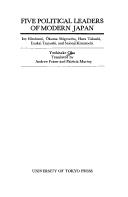| Listing 1 - 10 of 17 | << page >> |
Sort by
|
Book
ISBN: 9788972915829 Year: 2015 Publisher: 서울 까치글방
Abstract | Keywords | Export | Availability | Bookmark
 Loading...
Loading...Choose an application
- Reference Manager
- EndNote
- RefWorks (Direct export to RefWorks)
Book
Abstract | Keywords | Export | Availability | Bookmark
 Loading...
Loading...Choose an application
- Reference Manager
- EndNote
- RefWorks (Direct export to RefWorks)
Itō, Hirobumi --- 伊藤博文
Book
Abstract | Keywords | Export | Availability | Bookmark
 Loading...
Loading...Choose an application
- Reference Manager
- EndNote
- RefWorks (Direct export to RefWorks)
Itō, Hirobumi --- 伊藤博文
Book
ISBN: 9784396112417 Year: 2011 Publisher: 東京 祥伝社
Abstract | Keywords | Export | Availability | Bookmark
 Loading...
Loading...Choose an application
- Reference Manager
- EndNote
- RefWorks (Direct export to RefWorks)
Itō, Hirobumi --- 伊藤博文
Book
ISBN: 9782271067388 Year: 2008 Publisher: Paris CNRS
Abstract | Keywords | Export | Availability | Bookmark
 Loading...
Loading...Choose an application
- Reference Manager
- EndNote
- RefWorks (Direct export to RefWorks)
Japon, mai 1887. Le gouvernement autoritaire d'Itô Hirobumi élabore une constitution à huis clos. Les courants nationalistes et démocratiques s'affrontent. C'est dans ce contexte qu'est publiée cette satire poétique qui oppose les points de vue de 3 personnages : un gentleman occidentalisé qui défend la démocratie, un guerrier qui défend l'expansionnisme et un professeur, arbitre.
Book
ISBN: 9788974096090 Year: 2010 Publisher: 서울 눈빛출판사
Abstract | Keywords | Export | Availability | Bookmark
 Loading...
Loading...Choose an application
- Reference Manager
- EndNote
- RefWorks (Direct export to RefWorks)
An, Chung-gŭn, --- Itō, Hirobumi, --- Pak, To --- Assassination. --- Travel
Book
Abstract | Keywords | Export | Availability | Bookmark
 Loading...
Loading...Choose an application
- Reference Manager
- EndNote
- RefWorks (Direct export to RefWorks)
Korean resistance movements, 1905-1945 --- Nationalists --- An, Chung-gŭn, --- Itō, Hirobumi, --- Assassination.
Book
ISBN: 9004431039 9004430903 Year: 2020 Publisher: Leiden ; Boston : Brill,
Abstract | Keywords | Export | Availability | Bookmark
 Loading...
Loading...Choose an application
- Reference Manager
- EndNote
- RefWorks (Direct export to RefWorks)
In An Chunggŭn: His Life and Thought in his own Words , Jieun Han and Franklin Rausch provide a complete translation of all of An’s writings and excerpts from his trial and appeal. Though An is most famous for killing Itō Hirobumi, the contents of this volume show that there was much more to him than that. For instance, far from being anti-Japanese, An thought deeply about how China, Japan, and Korea could work together to build a regional peace that would eventually spread throughout the world. Now, for the first time, all of An’s extant writings have been assembled together into an English translation that includes annotations and an introduction that places An and his works in their historical context. This translation was funded by the Institute of Korean Studies, Yonsei University.
Human rights workers. --- An, Chung-gŭn, --- Itō, Hirobumi, --- Assassination. --- Korea --- History

ISBN: 0860083799 Year: 1986 Publisher: Tokyo University of Tokyo press
Abstract | Keywords | Export | Availability | Bookmark
 Loading...
Loading...Choose an application
- Reference Manager
- EndNote
- RefWorks (Direct export to RefWorks)
Statesmen --- Biography --- Japan --- Biography. --- History --- Itō, Hirobumi --- Ōkuma, Shigenobu --- Hara, Takashi --- Inukai, Tsuyoshi --- Saionji, Kinmochi
Book
ISBN: 9781138205918 9780415838863 Year: 2016 Publisher: London Routledge
Abstract | Keywords | Export | Availability | Bookmark
 Loading...
Loading...Choose an application
- Reference Manager
- EndNote
- RefWorks (Direct export to RefWorks)
"The brilliant and influential statesman, Itō Hirobumi (1841-1909), and the first prime minister of Japan's modern state, has been poorly understood. This biography attempts to set the record straight about Itō's thought and vision for Japan's modernisation based on research in primary sources. It outlines Itō's life: the son of a poor farmer, he showed exceptional talent as a boy and was sent to study in Europe and the United States. He returned home convinced that Western civilisation was the only viable path for Japan. Following the Meiji Restoration of 1868, Ito became a powerful intellectual and political force behind reforms of Japanese laws and institutions aimed to shape a modern government based on informed leadership and a knowledeable populace. Among his many achievements were the establishment of Japan's first constitution--the Meiji Constitution of 1889, and the founding in 1900 of a new type of constitutional party, the Rikken Seiyukai (Friends of Constitutional Government), which, reformulated after 1945, became the Liberal Democratic Party that has dominated Japanese politics in the postwar period. Concerning Itō's role as Japanese Resident-General in Korea from 1905, the author argues that Ito's aim, not understood by either the Japanese home government or Koreans themselves, was not to colonize Korea. He was determined to modernise Korea and consolidate further constitutional reforms in Japan. This aim was not shared by others, and Itō resigned in 1909. He was assassinated the same year in Manchuria by a Korean nationalist. The Japanese language edition of this book is a bestseller in Japan, and it received the Suntory Prize for Social Sciences and Humanities, one of Japan's most prestigious publishing awards"--
Statesmen --- Prime ministers --- Constitutional history --- Itō, Hirobumi, --- Political and social views. --- Japan --- Politics and government
| Listing 1 - 10 of 17 | << page >> |
Sort by
|

 Search
Search Feedback
Feedback About UniCat
About UniCat  Help
Help News
News